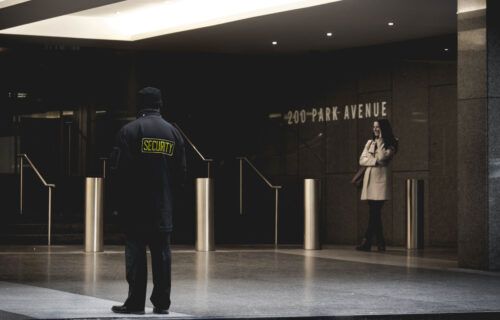Taking the first step towards advancing your career in the security industry is an exciting one. Whether you’re just starting or want to take your role to the next level, one thing’s for sure: Securing a security guard position demands preparation and finesse during the interview process. In this article, we’ll cover the ins and outs of security guard interview preparation and provide tips that will help you impress potential employers.
Understanding the Role of a Security Guard
As a security guard, your role is crucial in safeguarding people, property, and assets. Understanding the key responsibilities and duties is vital to prepare effectively for your interview. Employers often seek candidates who possess skills and qualities like:
- Keen observation
- Strong communication
- Quick decision-making
- Conflict resolution
- Integrity and trustworthiness
- Attention to detail
- Customer service skills
Researching the Company or Organization
Before heading into your interview, invest time in researching the company or organization. Understanding the employer’s values, mission, and security requirements impresses interviewers and helps you tailor your responses to their specific needs.
To gather information about the prospective employer, explore their official website. Look for their “About Us” page, company culture, and any security-related initiatives they may have undertaken. You can also scope out their social media profiles to gain additional perspectives on their reputation within the industry.
Dressing for Success
As a security professional, projecting a polished and professional image is crucial even before your first handshake. Dressing appropriately for your interview reflects your respect for the opportunity. Standard dress code can include:
- Professional attire: Suits, dress shirts, and dress pants, dresses, or skirts.
- Clean and polished looks: Ensure your clothes are clean and wrinkle-free, and attend to grooming as needed.
- Organized documentation: Include copies of your resume and other necessary documents in a professional folder.
Showcasing Experience and Qualifications
Showcasing your qualifications begins with tailoring your resume and cover letter. Customize your applications to highlight the skills most relevant to the position you’re seeking. Emphasize how your unique background can contribute to the company’s security goals, making you an invaluable asset to their team. For more resume tips, check out our guide to building a resume that elevates your security guard interview success.
The next step in proving your experience is presenting your qualifications in a stand-out way during the interview. To do this, highlight your relevant work experience, emphasizing responsibilities that align with the role’s demands. Share specific examples where you demonstrated essential skills in your previous jobs, like conflict resolution or quick thinking.
In addition to work experience, spotlight any relevant certifications, training, and education. Certifications like CPR, first aid, or specific security-related training add credibility to your candidacy.
Demonstrating Knowledge of Security Protocols and Procedures
When establishing your ability to follow security protocols and procedures, you must have a solid understanding of the basics, like access control, surveillance monitoring, emergency response, and incident reporting.
This knowledge can be challenging to demonstrate in a sit-down interview simply because you can’t physically show how you’d handle situations. That’s why it’s essential to articulate how you would apply these protocols in various scenarios. Provide examples from past experiences and indicate how you’d solve specific encounters in the future.
Mastering Interview Questions
There are different types of questions you may receive during your interview. Behavioural questions probe into your past experiences and actions, while situational questions assess your problem-solving skills and ability to think on your feet.
To structure your responses effectively, employ the STAR (situation, task, action, result) method. To give you better context, consider the following examples:
Behavioural Question
“Tell us about a time when you had to deal with a difficult individual at a previous security job. How did you handle the situation?”
- Possible answer using the STAR method: “In my previous position at a busy retail store, I encountered an individual who was causing a disturbance among customers (situation). My task was to de-escalate the situation while ensuring the safety of everyone present. To address this, I approached the individual calmly and professionally, maintaining a non-confrontational stance. I listened to their concerns and assured them that I’d assist them in resolving the issue. Taking action, I offered them a private space to discuss the matter further and called for backup to monitor the situation from a distance. As a result, the customer felt heard and valued, and the situation was resolved peacefully.”
Situational Question
“If you noticed unauthorized access to a restricted area, what steps would you take to address the issue?”
- Possible answer using the STAR method: “First, I would assess the situation by observing the individual’s actions and determining if it indeed constitutes unauthorized access. Then, the task would involve promptly approaching the individual to inquire about their purpose in the restricted area. I would politely but firmly inform them of the area’s restricted status and escort them back to the appropriate location. If the person resists, I would seek assistance from team members or contact the necessary authorities. These actions focus on preventing any potential security breach while ensuring compliance with established protocols. The result of this proactive approach would be the maintenance of a secure environment and the prevention of unauthorized activities in the area.”
Mistakes to Avoid
In high-stakes security guard interviews, avoiding common pitfalls is essential to make a strong and lasting impression. Some mistakes to steer clear of include:
- Poor body language: Non-verbal cues like lack of eye contact, fidgeting, or slouching can undermine your professionalism.
- Lack of research: Failing to research the company can show a lack of interest and preparation.
- Rambling responses: Providing lengthy, unfocused answers may convey disorganization and lack of clarity.
- Criticizing former employers: Speaking negatively about past employers reflects poorly on your attitude and adaptability.
Interview Best Practices
- Practice with a friend or in front of a mirror to build confidence and overcome nervousness.
- Arrive a few minutes early.
- Offer a firm handshake.
- Listen actively, paying close attention to questions and taking a moment to compose thoughtful responses.
- Send a thank-you message after the interview to express your gratitude and reiterate your interest in the position.
Ace Your Security Guard Interview
Understanding a role’s responsibilities, researching the employer, dressing appropriately, and showcasing your unique experience and qualifications can help you stand out from the pool of candidates. The key to a successful security guard interview is practice and preparation, and with the above tips, you’ll be well on your way to securing a position.
Explore your next opportunity today with Security Guards Only, with job banks for various cities, including Toronto, Chicago, London, and more. For more resources on how to set yourself up for interview success, check out our Resume Builder.




